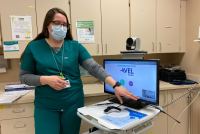Latest Morning Briefing Stories
Listen: Who Investigates Suspicious Deaths in Your Community — And Why It Matters
KHN senior correspondent Samantha Young appeared on the “Apple News Today” podcast and KOA, a public radio station in Denver, to discuss the difference between coroners and medical examiners and why it matters.
Hospitals’ Use of Volunteer Staff Runs Risk of Skirting Labor Laws, Experts Say
Hospitals using volunteers is commonplace. But some labor experts argue that deploying unpaid workers to do work that benefits the organization’s bottom line lets for-profit hospitals skirt federal labor laws, deprives employees of work, and potentially exploits the volunteers.
Behavioral Telehealth Loses Momentum Without a Regulatory Boost
As flexible treatment options spurred by the covid pandemic wane, patients relying on medications classified as controlled substances worry that without action to extend the loosened rules, it’ll be harder to get their meds.
In PA County Jails, Guards Use Pepper Spray and Stun Guns to Subdue People in Mental Crisis
An investigation of records from 25 county jails across Pennsylvania showed that nearly 1 in 3 “use of force” incidents by guards involved a confined person who was having a psychiatric crisis or who had a known mental illness.
Medicaid and Abortion Top Health Agenda for Montana Lawmakers
State lawmakers say their health care goals for the new legislative session are to lower costs and improve access to care. They’ll have to grapple with a full slate of other issues, as well.
California Senate’s New Health Chair to Prioritize Mental Health and Homelessness
California state Sen. Susan Talamantes Eggman of Stockton has been appointed chair of the Senate’s influential health committee. A licensed social worker, Eggman said she will make mental health care and homelessness front-burner issues.
During In-Flight Emergencies, Sometimes Airlines’ Medical Kits Fall Short
U.S. airlines have response plans for passengers who run into health issues in flight, but planes carry limited and sometimes incomplete medical supplies that can put travelers at risk.
What the Health? From KFF Health News: Year-End Bill Holds Big Health Changes
The year-end spending bill passed by Congress in late December contains a wide array of health-related provisions, including a structure for states to begin to disenroll people on Medicaid whose coverage has been maintained through the pandemic. Meanwhile, the Biden administration is taking steps to make the abortion pill more widely available. Joanne Kenen of the Johns Hopkins Bloomberg School of Public Health and Politico, Rachel Cohrs of Stat, and Rachel Roubein of The Washington Post join KHN’s chief Washington correspondent Julie Rovner to discuss these topics and more. Also this week, Rovner interviews Mark Kreidler, who reported and wrote the latest KHN-NPR “Bill of the Month” feature about a billing mix-up that took about a year to sort out.
NY Docs Are Now Required to Prescribe Naloxone to Some Patients on Opioid Painkillers
This strategy — now in place in at least 10 states — is part of an effort to curb accidental opioid overdose deaths by patients who take these powerful medications.
Lost Sleep and Jangled Nerves: The Rising Onslaught of Noise Harms Mind and Body
Noise pollution is a growing problem that isn’t confined to the ears: It can cause harm throughout the body. California is taking baby steps to address the increasing din from traffic and illegally modified cars, but public health experts urge lawmakers to act more boldly.
Public Health Agencies Try to Restore Trust as They Fight Misinformation
As public health departments work on improving their message, the skepticism and mistrust often reserved for covid-19 vaccines now threaten other public health priorities, including flu shots and childhood vaccines.
Many Families With Unaffordable Employer Coverage Now Eligible for Covered California Subsidies
If family coverage on an employer-sponsored plan is too expensive, a worker’s spouse and dependents may be eligible for Affordable Care Act subsidies under a new federal rule.
Telehealth Brings Expert Sexual Assault Exams to Rural Patients
Some rural residents must travel hours for a sexual assault exam. Specialized telehealth services are expanding so they can obtain care closer to home.
Weighing Risks of a Major Surgery: 7 Questions Older Americans Should Ask Their Surgeon
How do older adults know when the potential benefits from surgery are worth the risks? And what questions should they ask as they try to figure this out? Our columnist asks experts for guidance.
Want a Clue on Health Care Costs in Advance? New Tools Take a Crack at It
Another effort to make upfront cost comparisons possible in an industry known for its opaqueness: an online tool for consumers to get some idea of what they may pay for medical care.
‘An Arm and a Leg’: The Year in Review, From Prenatal Testing to Insulin Pricing
The editorial team of “An Arm and a Leg” looks back on the reporting that hit close to home over the past year, including insulin pricing and prenatal testing.
KHN-NPR’s ‘Bill of the Month’ at 5: A Treasury of Solutions for Confounding Medical Bills
Readers and listeners shared more than 1,000 personal stories of medical billing problems with KHN-NPR’s “Bill of the Month” investigative series this year, helping us illuminate the financial decisions patients are pressed to make in their most vulnerable moments.
Colorado Considers Changing Its Red Flag Law After Mass Shooting at Nightclub
In El Paso County, where five people were killed in a mass shooting at a nightclub in November, officials have filed relatively few emergency petitions to temporarily remove a person’s guns, with scant approvals.
Survivors of Gangs and Gun Violence, These Women Now Help Others Navigate Grief
As teens, these three women lived amid street gangs around East St Louis, Illinois. Now, as adults, they support the families who have lost loved ones to gun violence. And because of their past, some residents trust them more than they do the police.
Seasonal Cooks’ Secret Sauce: Heaping Nutrition and Cultural Zest
Two “nutrition ambassadors” from Oldways, an organization that makes tradition and pride centerpiece ingredients in food education, invite KHN into their kitchens for a peek at A Taste of African Heritage dishes to accompany holiday celebrations.


























